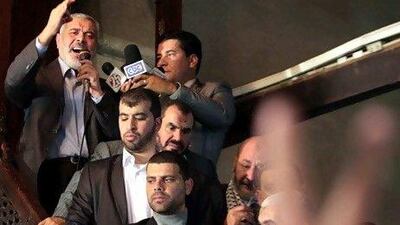Hamas's Gaza prime minister, Ismail Haniyeh, symbolically chose Cairo's Al Azhar Mosque, a spiritual and intellectual centre for global Islam, to declare Hamas had formally split with Syria, a former ally and once home to the Palestinian group's headquarters in exile.
Friday's declaration by Mr Haniyeh to thousands of Islamist supporters in the Egyptian capital, condemning Syria's bloody bid to quash an uprising against President Bashar Al Assad is perhaps the strongest indication of the group's realignment in a revolutionary Middle East.
"This is absolutely historic," said Walid Al Mudallal, professor of political science at the Islamic University of Gaza. "I think yesterday we witnessed the definitive split between the two."
Mr Al Mudallal and other analysts said Mr Haniyeh's comments not only confirm Hamas's rift with Syria and its revolutionary-Islamist allies - Iran and Hizbollah - it may also have cemented its repositioning in a Sunni Arab world of Islamist allies in Tunisia and Egypt empowered by the Arab Spring revolutions.
"I think it is only a matter of time before Hamas falls completely in the orbit of Egypt," said Mr Mudallal.
But until Friday, Hamas leaders had held back from venting their rage at the killing of thousands of pro-reform demonstrators by the regime of their sponsor, Bashar Al Assad, Syria's president.
They instead quietly dismantled their Damascus offices and sent staff packing for Cairo and the Gaza Strip, which the group controls.
Political observers attributed the silence to fear of angering Damascus, which gave Hamas over more than a decade lots of money, training facilities and shelter from Israeli warplanes.
That will be hard to replace.
But Mr Haniyeh tellingly praised Syria's opponents during Friday's speech as "the heroic people of Syria who are striving for freedom, democracy and reform".
No Hamas official would dare be so outspoken unless the group had alternative allies and financiers, said Daoud Kuttab, a Palestinian writer and analyst who lives in Amman and Jerusalem.
"Hamas has basically agreed to abandon its ties with Syria and Iran, and even the money they gave," he said.
"The money from Iran was already drying up, and Friday's declaration basically sealed that."
Iran gave Hamas hundreds of millions of dollars a year.
Hamas is asking Gulf states, especially Qatar - one of the world's richest countries - for money.
Doha helped Hamas and Jordan rebuild relations after Jordan's King Abdullah II expelled the group in 1999.
There also is some speculation that Hamas may rebase its headquarters in Egypt.
It has taken a far more active stance on the Palestinian issue than the former president, Hosni Mubarak, who was criticised for aiding Israel's blockade on Gaza.
Egypty has given Hamas more support
In May, Egypt's ruling generals loosened travel restrictions at the Rafah crossing between Gaza and Egypt.
That also was when they helped broker a reconciliation between Hamas and its rival in the West Bank, Fatah.
But such a move could be costly for a cash-strapped Egyptian government relying heavily on US aid.
Washington, which is generous to Egypt for its peace treaty with Israel, considers Hamas a terrorist organisation.
Not until after Egypt's recently elected parliament takes power could it consider embracing Hamas, said Abdel-Monem Aly, director of the Al Ahram Centre for Political and Strategic Studies in Cairo.
Although Hamas's outgoing leader, Khaled Meshaal, has toned down the group's stance towards Israel, it is still far from certain if Hamas would be accepted by Washington and the West.
This would probably require Hamas to recognise Israel's right to exist.
Mark A Heller, the principal research associate at the Tel Aviv-based Institute for National Security Studies, said Israeli leaders saw Hamas's changes as promising.
"We can try to clarify a bit more, but ultimately the same test that's been there and which Hamas has failed [up] to now is still valid," he said, referring to formal recognition of Israel.
hnaylor@thenational.ae
bhope@thenational.ae
Follow
The National
on
Hugh Naylor on
& Bradley Hope on

